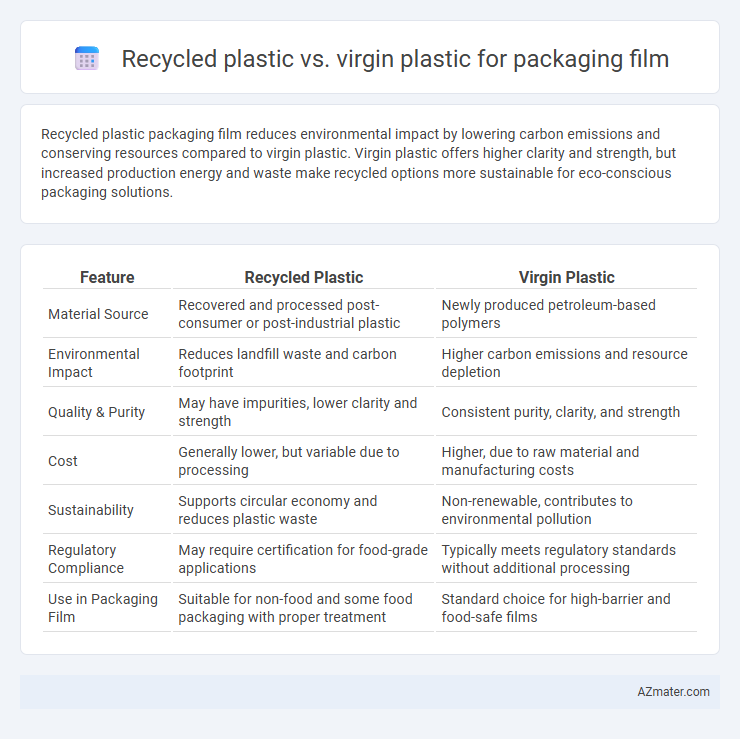Recycled plastic packaging film reduces environmental impact by lowering carbon emissions and conserving resources compared to virgin plastic. Virgin plastic offers higher clarity and strength, but increased production energy and waste make recycled options more sustainable for eco-conscious packaging solutions.
Table of Comparison
| Feature | Recycled Plastic | Virgin Plastic |
|---|---|---|
| Material Source | Recovered and processed post-consumer or post-industrial plastic | Newly produced petroleum-based polymers |
| Environmental Impact | Reduces landfill waste and carbon footprint | Higher carbon emissions and resource depletion |
| Quality & Purity | May have impurities, lower clarity and strength | Consistent purity, clarity, and strength |
| Cost | Generally lower, but variable due to processing | Higher, due to raw material and manufacturing costs |
| Sustainability | Supports circular economy and reduces plastic waste | Non-renewable, contributes to environmental pollution |
| Regulatory Compliance | May require certification for food-grade applications | Typically meets regulatory standards without additional processing |
| Use in Packaging Film | Suitable for non-food and some food packaging with proper treatment | Standard choice for high-barrier and food-safe films |
Introduction to Plastic Packaging Films
Plastic packaging films play a crucial role in protecting and preserving products, with materials sourced either from recycled plastic or virgin plastic. Recycled plastic films offer environmental benefits by reducing waste and lowering carbon footprints, while virgin plastic films provide superior clarity, strength, and barrier properties essential for sensitive goods. Selecting between recycled and virgin plastics depends on factors such as product requirements, sustainability goals, and regulatory standards within the packaging industry.
What is Virgin Plastic?
Virgin plastic is material produced directly from petrochemical feedstocks without any prior processing or reuse, ensuring high purity and consistent quality essential for packaging film applications. It offers superior mechanical strength, clarity, and barrier properties compared to recycled plastic, making it ideal for sensitive products requiring extended shelf life. Although more environmentally demanding in production, virgin plastic delivers the necessary performance standards for critical packaging needs.
What is Recycled Plastic?
Recycled plastic for packaging film is produced by processing used plastic materials to create new polymer pellets, reducing reliance on raw petrochemicals and lowering environmental impact. This sustainable alternative maintains functional properties like flexibility and durability while minimizing carbon footprint compared to virgin plastic, which is made from newly extracted fossil fuels. Using recycled plastic contributes to circular economy goals by diverting plastic waste from landfills and conserving natural resources.
Environmental Impact: Recycled vs Virgin Plastic
Recycled plastic packaging film reduces greenhouse gas emissions by up to 70% compared to virgin plastic production, conserving fossil fuels and reducing landfill waste. Virgin plastic manufacturing demands higher energy consumption and raw material extraction, significantly contributing to pollution and resource depletion. Utilizing recycled plastic promotes circular economy principles, lowering environmental footprint and advancing sustainable packaging solutions.
Cost Comparison: Recycled vs Virgin Plastic Films
Recycled plastic films generally offer cost savings of 10-30% compared to virgin plastic films due to lower raw material expenses and reduced energy consumption in production. Virgin plastic films, derived from petroleum-based feedstocks, often incur higher costs driven by fluctuating oil prices and more intensive manufacturing processes. Despite potential price variability, recycled films demonstrate economic advantages, making them a cost-effective option for sustainable packaging solutions.
Performance and Durability Differences
Recycled plastic packaging film often exhibits slightly lower mechanical strength and clarity compared to virgin plastic due to polymer chain degradation during recycling processes. Virgin plastic provides superior barrier properties, tensile strength, and consistent quality, enhancing packaging durability and shelf-life protection. However, advanced recycling technologies increasingly narrow this performance gap, making high-quality recycled films viable for many packaging applications.
Food Safety and Regulatory Considerations
Recycled plastic for packaging film requires rigorous testing to meet food safety standards set by agencies such as the FDA and EFSA, ensuring no harmful contaminants migrate into food products. Virgin plastic offers more consistent purity and fewer regulatory hurdles, as it originates from raw materials without prior exposure to potential contaminants. Compliance with migration limits and proper certification are critical factors influencing the choice between recycled and virgin plastics in food packaging applications.
Consumer Perception and Brand Image
Consumer perception heavily favors recycled plastic packaging film as it aligns with growing environmental awareness and sustainability values, enhancing a brand's eco-friendly reputation. Brands using recycled plastic often experience increased trust and loyalty among environmentally conscious consumers, contributing to a positive brand image. Virgin plastic, while offering consistent quality and clarity, may be perceived as less sustainable, potentially impacting brand appeal in markets prioritizing green practices.
Technological Advances in Recycled Plastic Films
Technological advances in recycled plastic films have significantly improved the barrier properties, clarity, and durability of packaging films, narrowing the performance gap with virgin plastics. Innovations such as advanced sorting techniques, chemical recycling, and compatibilizers enable higher-quality recycled content with consistent mechanical strength and transparency. Enhanced processing methods allow recycled films to meet stringent industry standards, promoting sustainable packaging solutions without compromising functionality.
Future Trends in Sustainable Packaging Films
Recycled plastic packaging films are gaining traction due to advancements in polymer recycling technologies that enhance material quality and performance, driving increased adoption in sustainable packaging. Virgin plastic films continue to dominate where purity and mechanical properties are critical, but innovations in bio-based additives and chemical recycling are expected to reduce reliance on fossil resources. Future trends emphasize circular economy principles, with a growing shift towards hybrid films combining recycled content and virgin polymers to balance sustainability and functionality in packaging applications.

Infographic: Recycled plastic vs Virgin plastic for Packaging film
 azmater.com
azmater.com